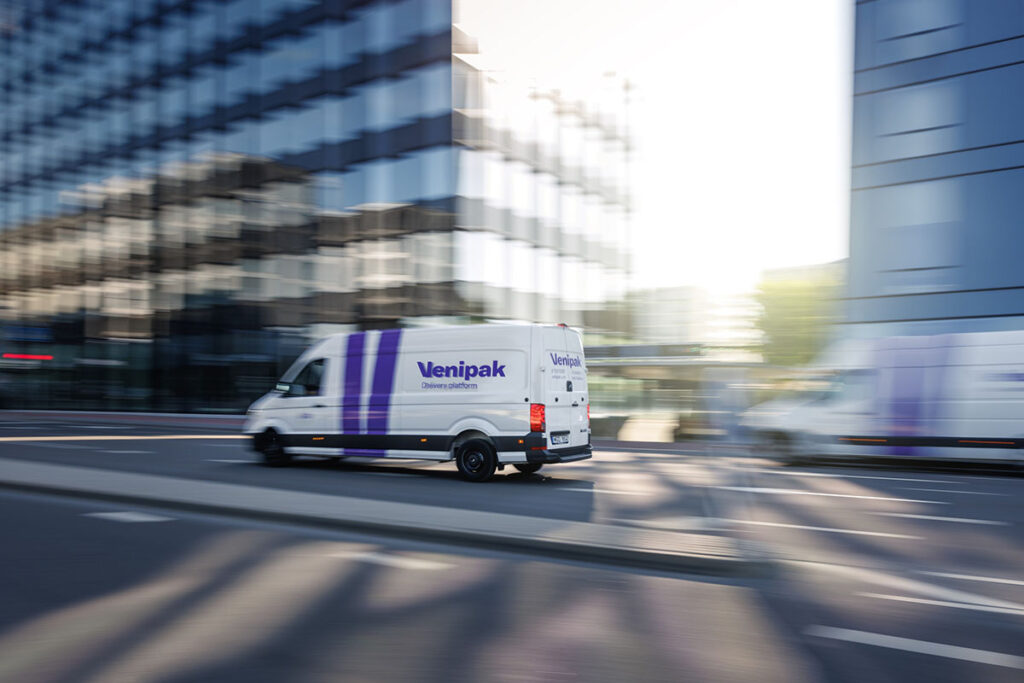Door-to-door delivery will eventually become a luxury service. After having reflected on last year and elaborating on the crucial elements of logistics and e-commerce market trends, the head of the international parcel company Venipak, Justas Šablinskas, is confident about this statement. An unexpected habit makes Baltic online shoppers stand out on a global level.
‘Once there is a wide coverage of pick-up points and parcel terminals, door-to-door delivery will become less relevant’, predicted Mr Šablinskas, adding that international deliveries are becoming more affordable and time-saving.
‘The world is getting smaller and couriers, with their logistical infrastructures, play a key role in facilitating access to remote areas. We are moving to a point where parcels can be delivered much faster and easier on a global level’, he said.
According to Mr Šablinskas, even though the economy stagnated and seasonal parcel peak times changed last year, parts of e-commerce kept growing. He noticed that parcel terminals are becoming more popular all over the world, and compared to Europe, the Baltic states are leading in this field.
Even though the economy stagnated, e-commerce kept growing.
There are two main seasons in the parcel business in terms of overall consumption: spring is when buyers switch to summer items, change their wardrobe and start spending more time in their gardens and homesteads, and winter is when there are the biggest sales, holiday preparation and winter items become popular. When speaking about last year, Mr Šablinskas noticed that due to the economic situation, these seasons were shorter and the seasonal parcel peak times were reduced.
‘These seasons used to last 3 months, but last year they lasted only 2 months. They were also milder. Usually, the number of parcels rises 30% during the season, but in 2023 it was lower, which signifies slower consumption’, remarked Mr Šablinskas.
Talking about the business-to-business, or B2B, market, the head of Venipak observed that due to the economic situation last year, many businesses did not achieve their objectives and had a decrease in growth, while others did not grow at all, with some even closing down. ‘It affected the numbers of parcels, but despite the stagnated economy, parts of e-commerce kept growing’, he said.
Increase in professional players and e-shops
As the head of the international parcel company for two decades, Mr Šablinskas observed that the market has changed a lot during this period. Only big names used to dominate in the market, whereas today there are more professional players, and local postal offices are more active and expanding on a global level.
‘Speaking of B2B market changes, many companies gave up their transport, courier services significantly improved and it became more effective and easier to provide their services with couriers instead of their own transport. This is especially relevant to companies that have locations all over the country’, said Mr Šablinskas and gave an example: before the companies had the possibility to send their items only once a week to Lithuanian towns, now thanks to couriers it’s possible to do it every day and companies have the opportunity to stock up their shops or warehouses more frequently and save their working capital.
 Justinas Šablinskas added that the business-to-consumer, or B2C, market has significantly increased in two decades. ‘As there was a massive rise in e-shops, a marketplace was created and delivery improved with door-to-door delivery services, utilising the parcel terminals that became very popular during the pandemic.’
Justinas Šablinskas added that the business-to-consumer, or B2C, market has significantly increased in two decades. ‘As there was a massive rise in e-shops, a marketplace was created and delivery improved with door-to-door delivery services, utilising the parcel terminals that became very popular during the pandemic.’
Baltic countries are leaders in using parcel terminals.
When comparing the markets of the Baltic countries, Mr Šablinskas noticed that the trends are very similar in all three countries. Parcel terminals are very popular in the Baltic region with Estonia being a leader.
Although parcel terminals are not as popular in Europe as they are in the Baltic countries, Justinas Šablinskas affirmed that the field of parcel terminals is rapidly expanding all over the world and the flow of parcels delivered via parcel terminals will grow even more in the future. ‘Seventy to eighty percent of e-commerce packages are delivered via parcel terminals in Baltic countries. The numbers are lower but increasing in Europe. To cover the whole of Europe with parcel terminals, larger investments are needed’, he said.
Consumer survey data also confirms the popularity of parcel terminals in the Baltic countries. Venipak asked the Institute for Marketing and Communication Sciences KOG to carry out a survey in October last year. According to the survey, more than one-third of Lithuanians, Latvians and Estonians use parcel terminals between once every 2-3 months to once every 3-4 weeks.




